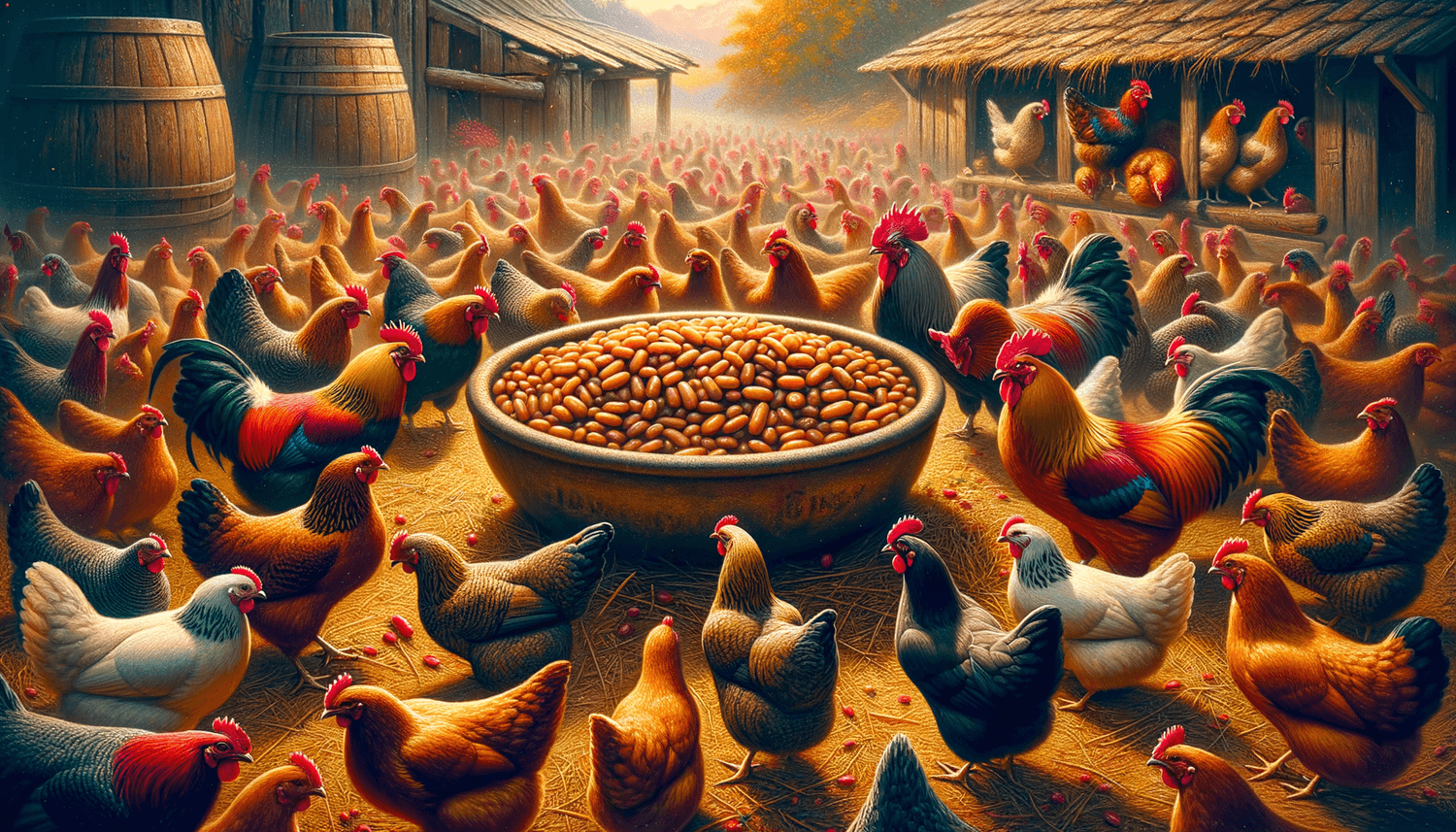Hi there, chicken comrades! Welcome to another cluck-tastic adventure in the wonderful world of backyard chickens. Today’s culinary quest – can chickens eat cooked beans? The answer might set your feathers a-flutter, as we’ll explore whether these tiny legumes are a wing-slap away from being a major chicken treat, or just a hen-ful of trouble. So, let’s cluck to it, and dig into the heart of this bean-tastic conundrum! We’ll talk about the importance of balanced diets, bean-fits (oh, come on, you can’t resist a good pun!), potential risks, and even how to prepare these little wonders for your feathered friends.
Can chickens eat cooked beans?
Yes, chickens can safely eat cooked beans! Beans are a nutritious snack for them, packed with protein and other essential nutrients. However, it’s crucial to thoroughly cook the beans before feeding them to your flock since uncooked or undercooked beans can contain a toxin called phytohemagglutinin, which could be harmful to your chickens.
Chickens need a balanced diet
Just like us humans, our feathery friends need a balanced diet to stay healthy and happy. A good diet is not only essential for laying appetizing eggs but also key to their general well-being. A balanced chicken diet primarily consists of high-quality chicken feed, which should form around 80-90% of their daily intake. This ensures that they receive the essential nutrients, minerals, and vitamins to thrive.
Now, we all love a little variety in our meals, and the same goes for chickens too! The remaining 10-20% of their diet can comprise treats such as fruits and vegetables. Adding these treats keeps mealtime enjoyable as chicks relish pecking at these enticing morsels. So, combining a nutritious chicken feed with a well-rounded selection of fruits and veggies sets your backyard flock up for a cluck-tastic life!
Nutritional value of cooked beans for chickens.
Cooked beans offer several nutritional benefits to chickens. One major advantage of beans is their rich protein content. It is well-known that chickens require substantial amounts of protein to maintain their growth, laying abilities, and overall health. Beans can serve as an excellent alternative protein source, supporting strong muscles and feathers.
Furthermore, cooked beans contain a variety of essential vitamins and minerals that can contribute positively to the health and well-being of your flock. Beans are a good source of B vitamins like B1, B2, B3, and B6, which support healthy metabolism, nervous system function, and red blood cell production in chickens. Beans also contain minerals such as iron, potassium, and magnesium, which play vital roles in their overall health, ranging from blood cell production to bone strength.
In addition to their protein, vitamin, and mineral content, cooked beans also provide chickens with valuable fiber, which aids in their digestion and overall gut health. While beans don’t have a high hydration content like some other treats you might feed your chickens, they can still contribute to the diversity of your chickens’ diet and keep them engaged with their food. However, beans should only be offered as a treat, and not as a primary food source, to ensure that they maintain the balance of vital nutrients required for optimal health.
Nutrition table of cooked beans for chickens.
| Information | Description |
|---|---|
| Nutritional Value | Rich in protein, B vitamins, minerals such as iron, potassium, and magnesium, and fiber. |
| Suggested Serving Size | Small amounts, alongside other treats making up no more than 10-20% of their overall diet. |
| Safe Feeding Practices | Ensure that beans are properly cooked to remove harmful toxins. Never feed raw or undercooked beans. |
| Preparation | Thoroughly cook beans, and cool them down before feeding to chickens. Beans can be fed whole, mashed or mixed with other treats. |
| Potential Risks | Raw or undercooked beans contain a toxin called phytohemagglutinin, which can be harmful to chickens. |
| Hydration | Beans have low hydration content in comparison to other fruits and vegetables and should not be relied upon for hydration. |
| Digestion | Fiber content in beans supports digestion and gut health in chickens. |
| Seasonal Availability | Beans are widely available year-round, making them a convenient treat for your chickens. |
| Other Benefits | Adding cooked beans to chickens’ diets can contribute to muscle and feather health, and provide a diverse source of nutrients. |
Offering Variety with Beans
Introducing cooked beans into your chickens’ diet can be made even more exciting by offering various types of beans. From black beans and navy beans to kidney beans and pinto beans, the list is endless. Remember to ensure that each type is properly cooked before feeding it to your flock, and always in moderation. Mixing cooked beans with other vegetables, greens, and fruits can create a delightful chicken salad they will love pecking at!
Consider Bean Alternatives
If you’re looking to provide even more diversity to your chickens’ diet, consider other legumes like cooked lentils, peas, and chickpeas. These alternatives are also packed with protein, nutrients, and minerals to help support the health and well-being of your chickens. As always, remember that the mainstay of their diet should be a high-quality chicken feed, and treats should be fed with balance and moderation.
Monitoring Your Chickens’ Health
It is essential to pay close attention to your chickens’ health when introducing new treats to their diet, even if those treats are considered safe, like cooked beans. Monitor your chickens for any changes in behavior, appearance, or egg-laying frequency that might indicate an adverse reaction or an imbalance in their dietary intake. If you suspect any issues, consult with a veterinarian or poultry expert, and re-evaluate your chickens’ diet accordingly.
Ultimately, the goal is to achieve a well-balanced diet for your backyard flock that contributes to happy, healthy, and high-performing chickens!

















